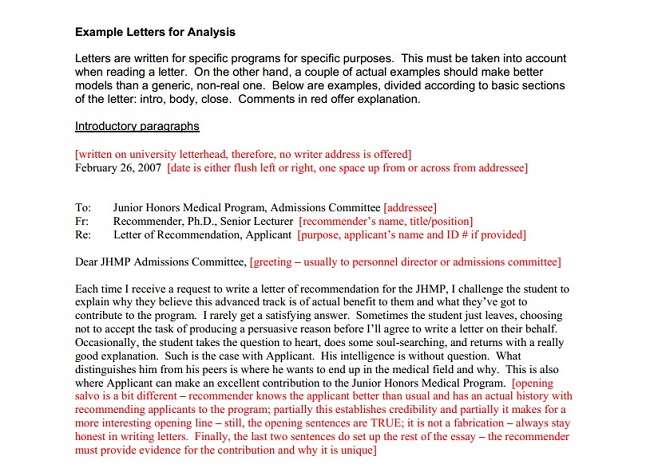There are many stages to progress through when building a career in psychology. Most of these steps depend on preparation and completion of previous stages in order to advance. One of the necessary steps you must take to advance your career in psychology is having letters of recommendation written on your behalf.
You don’t want your letter-writer choices to be the result of a hasty decision. Much forethought and planning goes into successful recommendation letters. Read this guide to breeze through the process with wonderful letters written on your behalf.
What are they?
A letter of recommendation, or reference letter, is a note written by someone you know in authority who can testify to your knowledge, skills, and character in the field of psychology (or the study of psychology). This authority figure is either a professor, supervisor, or some other key figure who can deliver expert testimony on your abilities. The document serves as the individual’s informed recommendation that you are a good and worthy candidate for:
- college or university
- jobs
- graduate school
- other advanced educational programs
- internship programs
Sample Letter

Why do you need them?
Simply put, you need letters of recommendation to attest to your abilities before you have the opportunity to prove them yourself. Decision-makers in colleges and graduate programs of psychology cannot do a test-run to see if you are a good fit for their programs. Therefore, they base their decisions around the content of these letters and the professional evaluation of the individuals writing them.
As you can see, this means these reference letters are extremely important. You have worked diligently to pursue a career in psychology by keeping your grades up, volunteering with reputable organizations and in meaningful positions, and researching the top programs/jobs to fit your career aspirations. You should also put advanced planning and effort into building relationships and making impressions on the key people who can serve as your letter-writers.
How many do you need?
In general, most colleges and graduate schools require three letters of recommendation. On the other hand, a job or internship may have very different requirements. The application for entrance into the program will usually specify how many letters you need.
Another factor to consider is the types of letters you need. Tufts Career Center describes recommendation letters as either field-specific or character-specific. Since you are looking to advance yourself in the field of psychology, you will probably want at least 2 of your letters to be field-specific and only 1 to be character-specific. Regardless of the type, letter-writers should still be able to provide their expert decision on your abilities.
Field-specific letters:
- provide a summary of your skills from an industry point-of-view
- remark on your knowledge and applied abilities in the area of study or work
- extend the letter-writer’s feedback on how well you will succeed in the new program or position
- are written by professors in the area of study as well as industry-related employers or supervisors
Character-specific letters:
- provide a summary of the skills that may not be exemplified in other areas of your application–tenacity, open-mindedness, ability to work well with others, etc.
- the letter-writer is not within the chosen field
- remarks on your ability to excel in the field based on your personal attributes
- are written by professors outside the industry, supervisors from volunteer experiences, and other authority figures who can speak on your personal characteristics
How to get them?
As mentioned previously, a great deal of consideration should go into these reference letters, because, ideally, you would want them to portray you as a strong candidate. Get your recommendation by choosing who can best remark on your skills, asking these individuals, and providing them with necessary information to write well-rounded, descriptive letters.
YouTube Special Feature
When it comes to applying to a highly selective university, a student’s grades and activities aren’t enough. Admissions counselors want to get to know a potential student and learn why he or she is the best fit for their university. That’s why letters of recommendation are so important.
1. Writer Selection
This aspect of the process should not be rushed through; the persons you choose to recommend you can literally make or break your chances of getting into the college, school, or job you want. Ask yourself these questions before making any choices:
- Can this person speak on either my abilities within the field or important character traits?
- Does this person understand my career aspirations and where I am applying?
- Does this person know me well and for long enough to expertly discuss my abilities, or have they only met me in passing?
- Do I have a positive relationship with this individual?
- Does this person view me favorably over others
- Can they comment on my work in detail?
2. Asking
Requesting a letter of recommendation should be done in person, if possible. Be sure to talk over with the individual about where you are applying and why you are interested in these programs/positions. Also, approach them at least a month in advance, so that they have plenty of time to reflect on your abilities and form a great letter. Remember to aim for a variety of letters that can depict your finest qualities, taking care to choosing at least one person to write a character-specific letter if one is required.
If you notice any hesitation or change in energy when you are discussing your recommendation letters–whether because they are not fond of you or the programs/jobs you are applying to–cut your losses and choose someone else. Letters of recommendation should speak about you favorably, although not excessively so, and you do not want to waste your time or the time of the application committee with someone who does not approve of your career aspirations.
3. Provide Necessary Info
Once your proposals have been accepted, you should provide your letter-writers with the information they need. Ideally, you will have already prepared packets to put in their hands once they accept or to send via email afterwards.
Information that can help with the writing process includes:
- Transcript
- Resume /curriculum vitae if applying for employment (which includes teaching and research experience, employment experience, volunteer experience, professional objectives, professional organizations you belong to, and awards)
- Copy of your admission essays
- Copy of the criteria for letters of recommendation from each program you are applying
- A letter expressing appreciation for their help in the process and including all the particulars such as deadlines, program names, contact persons, and stamped and addressed envelopes
4. Follow-up
After you have completed steps 1-3 above, check back with your letter-writers as the deadline approaches. Some professors have busy schedules and can easily forget to get the letters in on time.
Also, check with the program you are applying to see if the letters are arriving as scheduled and if there are any issues with the process.







